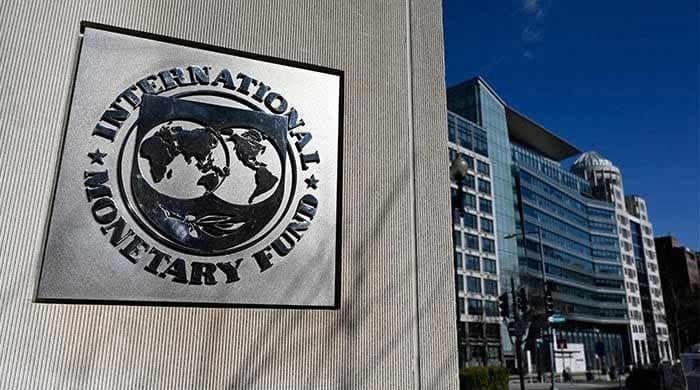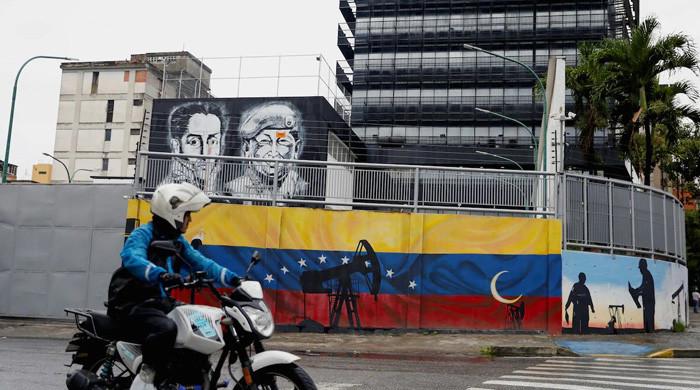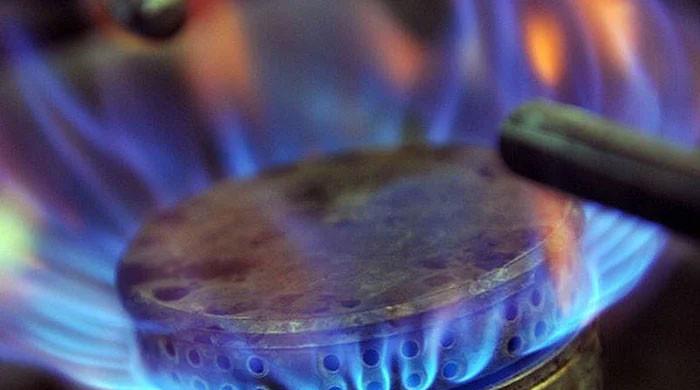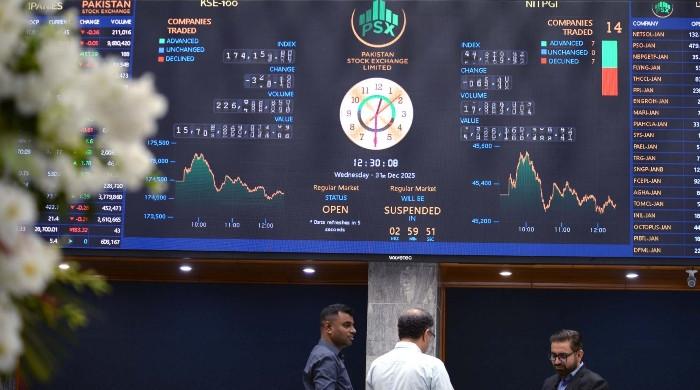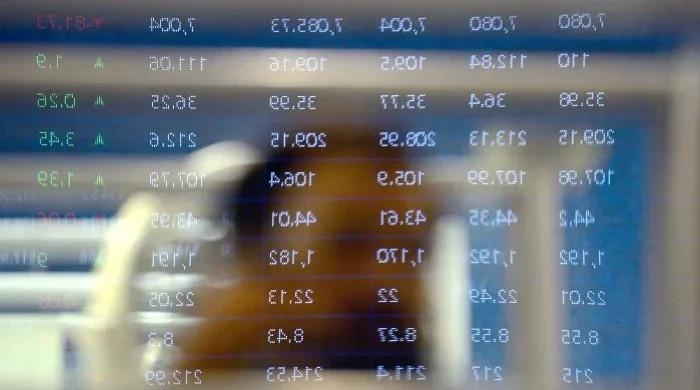Pakistani bourses show more strength amidst looming recession
Pakistan has done relatively well at a juncture when weaknesses in the international capital markets can lead to more volatility and enhance the risk of recession in the days and weeks to come
January 19, 2016
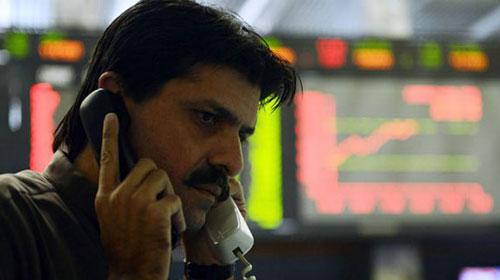
By Sabir Shah
LAHORE: Regardless of the fact that a majority of the equities markets are performing negatively all over the world due to persistent worries about the dismal outlook of the Chinese economy and the dipping of oil prices to their lowest level of $28 per barrel since September 2003, Pakistan has done relatively well at a juncture when weaknesses in the international capital markets can lead to more volatility and enhance the risk of recession in the days and weeks to come.
For most economic experts, the Pakistani economy might be dwindling for long, but the fact has it that the country’s KSE100 Index has lost 3,158 points or 9.35 percent during the last 12 months from 33,786.44 points in January 2015, which may not be dubbed the best and the most ideal of performances, but it is still a heartening accomplishment if one views what has happened with the strongest and the biggest international economies of late.Given the fact that Pakistan's economy is a lot weaker than many in the world, the Karachi Stock Exchange could have collapsed like a house of cards within no time, but it has managed to absorb the shocks somehow.
Let us briefly review and analyse what is currently happening internationally. The People’s Bank of China has been compelled to make its largest downward adjustment to the Yuan in over two decades amidst concerted efforts to curb the offshore speculation in the currency, hence raising concerns about capital flight from the Asian giant. The worrisome slump in the European and US equities due to sinking crude prices has sent sinking feelings down the diaphragms of the men controlling and investing in these formidable economies.
While the US stock and bond markets had remained closed on Monday due to the annual Martin Luther King Junior holiday, the European stock markets had succeeded in edging back into the red again, reversing the gains made earlier on Monday (yesterday).
Be it the Dow Jones and the S&P (Standard & Poor's) 500 Indices in the United States, the FTSE (the Financial Times Stock Exchange 100 Index) in London, the DAX (Deutscher Aktienindex or the German stock index) in Germany, China's blue-chip CSI300 or the CAC (Cotation Assistee en Continu or the benchmark French stock market index) in France, the global rout in the market capitalisation of equities has plunged to the lowest since 2013 and the investor sentiment is visibly fragile everywhere.
It goes without saying that investors everywhere on the planet are still expecting the worse since there is already a global oil glut and Iranian supplies are most likely to push the price down further.
The Japanese stocks have hit one-year low. There has been a drastic fall in the value of scrips listed on the bourses in Dubai, Saudi Arabia, Canada and Hong Kong, etc. Last Friday, the Canadian stock market had dipped more than two per cent as jitters about the global economic growth had weighed heavily on the already-shaken investor sentiment.
Russia, one of the largest oil exporters, has raised its interest rate by more than 17 per cent. Already disturbed over the slapping of Western sanctions over the country's support for separatists in eastern Ukraine, Russia normally loses about $2 billion in revenues for every dollar fall in the oil price, and the World Bank has already warned that Moscow's economy would shrink by at least 0.7 per cent if oil prices do not recover.
South Korea's stocks have nose-dived and its currency Won has depreciated to a five-year low -- thereby pushing the country's 10-year bond yield to a record low. Similarly, more than £27 billion were wiped off stocks in the Middle East alone, following fears of Tehran entering the oil war with a bang!
(References: The Telegraph, BBC News and the Bloomberg etc)
On Monday (yesterday), the Pakistan KSE100 Index did decrease 373.1 points or about 1.2 per cent to 30,628.40 points from 31,001.49 in the previous trading session. In comparison, the global economic outlook is a lot darker and gloomier as Iran prepares to boost exports after the lifting of international sanctions.
Historically, the Pakistan Stock Market (KSE100) had managed to reach an all-time high of 36,228.88 in August of 2015. However, the Saudi Arabian Oil Minister, Ali al-Naimi, is confident that oil prices would rise in due course. He was quoted by the "Bloomberg" as saying: "I am optimistic about the future, the return of stability to the global oil markets, the improvement of prices and the co-operation among the major producing countries. Market forces as well as the co-operation among producing nations always lead to the restoration of stability. But this might take some time."
Al-Naimi had declined to comment when asked how the removal of economic sanctions against Iran might affect crude prices though. According to data compiled by the Bloomberg, Saudi Arabia had produced 10.25 million barrels a day in December, up 750,000 barrels a day from the end of last year.
Another prestigious Western media outlet had quoted Richard Nephew, Programme Director for the "Economic Statecraft, Sanctions and Energy Markets" at Columbia University's Center on Global Energy Policy as opining: "Iran is now free to sell as much oil as it wants to whomever it likes at whatever price it can get." A premier British newspaper The Telegraph has stated: "Brent crude briefly fell to fresh multi-year lows below $28 (£19.50) a barrel in Asia on Monday on fears of a worsening supply glut after Western sanctions on Iran were lifted, allowing the country to resume oil exports."
At one point, the Brent crude had shed 1.3 per cent to fall as low as $27.70 before rebounding by more than 2 per cent to $29. The slide was witnessed after the Organisation of Petroleum Exporting Countries (OPEC) said persistently low prices would finally begin to bite for rival producers in 2016, forcing the US and Canada to cut back on production this year."
The BBC News has reported: "The global oil prices have fallen sharply over the past seven months, leading to significant revenue shortfalls in many energy exporting nations, while consumers in many importing countries are likely to have to pay less to heat their homes or drive their cars. From 2010 until mid-2014, world oil prices had been fairly stable, at around $110 a barrel."—Originally published in The News




